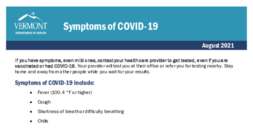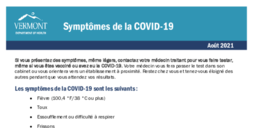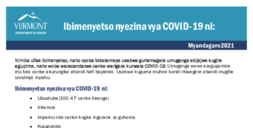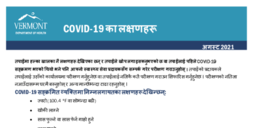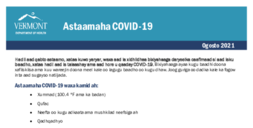As of March 6, this page has been updated to align with new CDC recommendations. This guidance does not apply to health care workers, long-term care facilities or other health care settings such as hospitals.
Symptoms
People with COVID-19 may have a wide range of symptoms, including no symptoms at all, mild or moderate symptoms, or needing medical attention for severe illness. Even people with no symptoms can spread the virus to others. Common symptoms of COVID-19 and other respiratory viruses can include fever, chills, fatigue, cough, runny nose and headache.
What to Do if You Are Sick
If you are feeling sick with respiratory virus symptoms:
- Avoid contact with others, including people you live with who are not sick.
- Consider testing for COVID-19 to help you decide if you need to take more steps to protect yourself and others. If you test negative for COVID-19, you may be sick with another respiratory virus that you can spread to others.
- Talk to a health care provider about treatment and other options if you are at risk of getting very sick or your symptoms get worse. Groups at higher risk for severe illness include young children, older adults, people with weakened immune systems, people who are pregnant, and people with disabilities.
Returning to Normal Activities
You can still spread the virus to others, even if you are feeling better. If you develop a fever or start to feel worse, avoid contact with others again until you feel better.
Your work place, school or child care program may have different return policies. Please check with those organizations directly to learn more.
You can go back to your normal activities after at least one day (24 hours) if:
Your symptoms are getting better overall
and
- You have not had a fever for at least 24 hours (and are not using fever-reducing medicines).
After returning to normal activities, take extra prevention steps for the next 5 days.
Any of these prevention steps can help limit the spread of respiratory viruses. The more steps you take, the lower your risk of getting others sick.
- Practice good hygiene. Wash your hands often with soap and water or use hand sanitizer, cover your coughs and sneezes, and clean and disinfect surfaces as much as possible.
- Keep physical distance with other people as much as possible.
- Improve air quality. Take additional steps for cleaner air such as bringing in fresh outside air, using an air filter, or gathering outdoors.
- Wear a mask. Look for a well-fitting, high-quality mask, or a disposable mask under a cloth mask. Masks are a good protection measure for all respiratory viruses.






